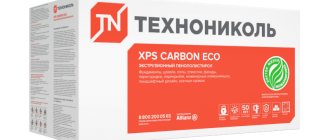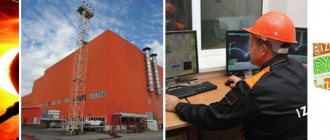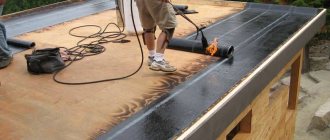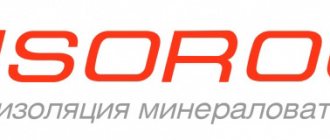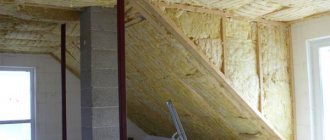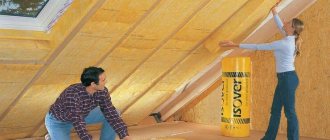In the cartoon about Alyosha Poppovich, he had three paths. Today there is more choice when choosing insulation. However, it is THREE manufacturers that especially stand out: Knauf, Rockwool and our guest today, TechnoNikol insulation products.
The TechnoNikol company was founded in 1993 and today, almost 24 years later, it is the market leader in the field of building materials, in our case thermal insulation. The photo below shows how mineral wool production increased from 2003 to 2015.
Someone will immediately say that in the case of well-known brands you need to overpay for the name, but in an era of crisis this is a very controversial issue. In general, the premium for time-tested quality is worth the nerves and extra effort spent on “fighting” with bad materials made “on the knee”. But, in an era when every manufacturer is fighting for every customer, such markups are becoming a thing of the past.
The company produces materials that are used at very serious facilities:
- Alexandria Theater; Saint Petersburg;
- Torgovy, Nizhny Novgorod;
- Drama Theatre, Omsk;
- St. Petersburg State Technical University, St. Petersburg;
- Trade St. Petersburg;
- Konstantinovsky Palace, St. Petersburg;
- Crimean Bridge, Moscow.
The company produces thermal insulation from two main materials:
- Mineral wool;
- Expanded polystyrene.
Basalt wool, names
Insulation materials made from cotton wool are produced in ten main directions:
- AXI,
- BASALT,
- TECHNOACUSTIC,
- ROCKLIGHT,
- TECHNOBLOCK,
- TECHNOVENT,
- TECHNOLIGHT,
- TECHNORUF,
- TECHNOFAS,
- TECHNOFLOOR.
Of course, each direction represents a material for a specific application. Some types are more or less universal insulation materials. For example, Technofas, as the name suggests, is a slab for facade insulation from TechnoNikol.
Stone wool is produced at factories in Cherkassy, Rostov-on-Don, Zainsk and Chelyabinsk. [flat_ab id=”33"]
Where is it used?
Builders use the material to perform thermal insulation and sound insulation work. This substance minimizes the penetration of cold and heat loss. Experts prefer to use stone wool in frame buildings and for insulating residential buildings.
In what works are they used:
- KV processes metal, concrete, stone and wooden walls from the outside and inside.
- For insulation of small architectural forms (balconies, loggia) and small extensions.
- For floor insulation.
- On floors, ceilings and walls.
- For the purpose of insulation of pipelines, chimneys, stoves and ventilated facades.
Characteristics of stone wool
In general, the features of TechnoNikol stone wool and its technical characteristics are very similar. Basically, when choosing a material, it is worth considering:
- Manufacturer's recommendations;
- Density (hardness);
- Material type.
The manufacturer initially recommends certain types of insulation for specific tasks. For example, Technoacoustic slabs are used to soundproof interior partitions. In the video below, at 6 minutes 31 seconds, the manufacturer recommends Rocklight for attic insulation.
And TechnoNikol recommends Technofas as facade insulation. If there is a need to insulate the foundation, TechnoNikol recommends Technoruf. In general, foundation insulation should be carried out using hard mineral wool slabs.
Density is the second important factor that affects the area of application of cotton wool. There are three main types of wool layout:
- Mats (rolls);
- Soft slabs;
- Rigid slabs;
Mats or rolls are used to insulate the floor in the attic or it can be laid between floors. Insulating the walls of balconies and loggias may require the use of rigid slabs if there is no possibility or desire to use lathing.
| OPTIONS | ROCKLIGHT | HEATROLL | TECHNOACUSTIC | TECHNOBLOCK |
| Thermal conductivity at 10 0С, (W/m·C) | 0,039 | 0,036 | 0,035 | 0,035 |
| Vapor permeability, not less, mg/(m h Pa) | 0,3 | 0,3 | 0,3 | 0,3 |
| Water absorption by volume, no more, (%) | 2,0 | 2,0 | 1,5 | 1,5 |
| Density (%) | 30-40 | 25-35 | 38-45 | 40-50 |
| Flammability (degree) | NG | NG | NG | NG |
| Compressibility, no more (%) | 30 | 55 | 10 | 8 |
Characteristics of TechnoNIKOL mineral wool
Basalt wool is a common thermal insulation material. The excellent characteristics of basalt wool, such as low thermal conductivity, high density, high compressive strength, and resistance to deformation, distinguish this material from its competitors.
Thermal conductivity of basalt wool
TechnoNIKOL stone wool to retain heat, maintaining the required temperature in the room. TechnoNIKOL materials are very resistant to the negative effects of water, because they are made from stone. To increase water-repellent properties, thermal insulation materials are treated with water-repellent additives. The structure of the materials is 99% air. It is this parameter that is the basis of vapor permeability and ensures the “breathing” of the walls. TechnoNIKOL basalt wool has a thermal conductivity ranging from 0.034 W/m*S ( TECHNOBLOCK, TECHNOFLOOR SOIL, TECHNOFLOOR SOIL, TECHNOFLOOR CONCRETE ) to 0.047 W/m*S ( TECHNOFLOOR PROF ).
Vapor permeability of basalt wool
Water vapor penetrates well through the material and does not condense in the thickness. Hydrophobizing additives reduce the wettability of the material, preventing moisture from entering the fibers. The vapor permeability of Technonikol materials is 0.4–0.6 mg/h Pa m. Insulation materials are resistant to mechanical loads, this is ensured by the properties of the fiber itself and the structure of basalt wool. A “frame” made of interwoven fibers works very well.
Density of basalt wool
The density of basalt wool is a characteristic calculated depending on the use of the material, climatic zone and other factors. The cost of insulation depends on its density, because more materials are used to produce a material of higher density. The density of TechnoNIKOL ranges from 30-40 kg/m3 ( ROCKLIGHT, TECHNOLIGHT ) to 190 kg/m3 ( TECHNOFLOOR PROF ).
Dimensions of basalt wool, length, width, insulation thickness
| Material | Length, mm | Width, mm | Thickness, mm |
| ROCKLIGHT | 1000, 1200 | 500, 600 | 50, 100 |
| TECHNOLIGHT | 1000, 1200 | 500, 600 | 40-200 |
| TECHNOBLOCK | 1000, 1200 | 500, 600 | 40-200 |
| TECHNOVENT | 1000, 1200 | 500, 600 | 40-200 |
| TECHNOFLOOR SOIL | 1000, 1200 | 500, 600 | 40–150 |
| TECHNOFLOOR STANDARD, PROF | 1000, 1200 | 500, 600 | 20–50 |
| TECHNSANDWICH | 1200, 2400 | 600, 627, 800, 1200 | 102, 122 |
| TECHNORUF | 1000, 1200 | 500, 600 | 50–110 |
| TECHNORUF N | 1000, 1200 | 500, 600 | 50-200 |
| TECHNORUF V | 1000, 1200 | 500, 600 | 30-50 |
| TECHNOFAS L | 1000, 1200 | 200 | 40-240 |
| TECHNOACUSTIC | 1000, 1200 | 500, 600 | 40-200 |
| HEATROLL | 1000-14000 | 500, 600, 1000, 1200 | 40-200 |
| TECHNOFAS | 1000, 1200 | 500, 600 | 40–150 |
The dimensions of basalt wool depend on whether it is a slab or a roll and where it will be used (for convenience). As for thickness, this characteristic affects the level of thermal insulation. The lowest thickness of TECHNOFLOOR STANDARD and TECHNOFLOOR PROF is 20–50 mm. To insulate the outside of facades, higher density basalt wool can be used. TECHNOFAS L material is available in the following sizes: length - 1000, 1200 mm; width – 200 mm, thickness – 40-240 mm in increments of 10 mm.
Application of mineral wool boards
TechnoNIKOL materials is their clear positioning regarding the area of application. Technical characteristics are set so that materials work as long and efficiently as possible in a particular building structure.
TECHNOLITE . The boards are used for sound and heat insulation of building structures of industrial and residential buildings, where the insulation will not be subject to external loads. Suitable for insulating inclined, horizontal and vertical structures, such as pitched roof coverings, attic floors, attics, floors, frame walls, etc. Density – 30-40 kg/m³.
ROCKLIGHT. This type of mineral wool is designed to provide insulation for inclined, horizontal and vertical structures, such as attics, three-layer frame walls, siding, floors, partitions and ceilings. Density is 30 kg/m³.
TECHNOBLOCK . These boards are used for thermal insulation of residential and industrial buildings. They are often used as a middle layer of thermal insulation for three-layer masonry materials (well masonry, layered masonry). Density – 45-65 kg/m³.
TECHNOVENT . The material is used in industrial and residential construction as insulation. The boards are a thermal insulation layer in ventilated facades. Density – 80-100 kg/m³.
TECHNOFAS . These are non-flammable mineral wool boards used in industrial and residential construction. It is used as a thermal insulation layer for external walls, on top of which a protective and decorative layer of thin-layer plaster is applied. Density – 145 kg/m³.
TECHNOFLOOR . GRUN slabs are used for sound and heat insulation of floating floors, floors on the ground, and heated floors. STANDARD is suitable for sound and thermal insulation of floating floors in the case of laying cement screed or concrete on a thermal insulation layer. PROF slabs are used to insulate floors subject to heavy loads (floating, under screed, heated). Used in industrial sports premises and warehouses. Density – 90-110 kg/m³.
TECHNORUF . Application options: thermal insulation of civil and industrial construction. Suitable for new construction and renovation of buildings for various purposes. The slabs can be the main thermal insulation layer in corrugated and reinforced concrete coverings with any type of roofing carpet, not necessarily the installation of protective screeds. Density – 140-180 kg/m³.
TECHNONICOL stitching mat . Application options: thermal insulation and fire protection of civil and industrial buildings. Mats are used to insulate conical, cylindrical and flat surfaces and ventilation ducts. Galvanized mesh, which gives the insulation rigidity and facilitates installation work, is sewn to the mat with steel wire. The mats are suitable for insulating surfaces with temperatures up to 750 °C. Density – 80-100 kg/m³.
There are other TechnoNIKOL products used for various purposes. Basalt wool is mainly used for thermal insulation of rooms, pipelines, many installations, etc. This material is indispensable in modern construction.
Brands and characteristics of TechnoNIKOL basalt wool
| Brand | Thermal conductivity, W/m*S | Density, kg/m3 | Vapor permeability, mg/(m.h.Pa) not less | Water absorption by volume, % no more | Compressibility, % no more | Compressive strength at 10% deformation, kPa | Humidity by mass, % no more |
| ROCKLIGHT | 0,037-0,041 | 30-40 | 0.3 | 2 | 30 | 12 | 2 |
| TECHNOLIGHT | 0,036-0,041 | 30–38 | 0.3 | 1,5 | 20 | 15 | 0.5 |
| TECHNOBLOCK | 0.035 | 40-50 | 0.3 | 1,5 | 8 | 20 | 0.5 |
| TECHNOVENT | 0,036-0,039 | 10 | 0.3 | 1,5 | 2 | 10–12 | 0.5 |
| TECHNOFLOOR SOIL | 0,034-0,043 | 81–99 | 0.3 | 1,5 | 30 | 12 | 0.5 |
| TECHNOFLOOR STANDARD | 0,035-0,044 | 99–121 | 0.3 | 1,5 | 20 | 25 | 0.5 |
| TECHNOFLOOR PROF | 0,038-0,047 | 155–185 | 0.3 | 1,5 | 25 | 50 | 0.5 |
| TECHNOSANDWICH CONCRETE | 0,034-0,036 | 100 | 0.3 | 1,5 | 40 | 20 | 0.5 |
| TECHNORUF 45 | 0,038-0,042 | 126-154 | 0.3 | 1,5 | 10 | 45 | 0.5 |
| TECHNORUF N30-WEDGE | 0,038-0,042 | 100-130 | 0.3 | 1,5 | 15 | 30 | 0.5 |
| TECHNOACUSTIC | 0,035-0,040 | 38-45 | 0.3 | 1,5 | 10 | 12 | 0.5 |
| HEATROLL | 0,036-0,041 | 25-35 | 0.3 | 2 | 55 | 15 | 2 |
| TECHNOFAS | 0,038-0,042 | 131–159 | 0.3 | 1 |
How much does TechnoNikol mineral wool cost?
The characteristics of TechnoNikol insulation also include cost. In this section we provide the approximate cost of the most popular TechnoNikol stone wool insulation.
| Name | Size | Thickness | Number of slabs per package | Square | Price | Price 1 sq. meters |
| Rocklight | 1200Х600 mm | 50 mm | 12 | 6,91 | 514 rub. | 74 rubles |
| Technoblock PROF | 1200Х600 mm | 80 mm | 6 | 6,91 | 918 rub. | 133 |
| Technolight Optima | 1200Х600 mm | 50 mm | 12 | 8,64 | 603 | 70 |
| Technofas Optima | 1200Х600 mm | 50 mm | 6 | 4,32 | 951 | 220 |
| GreenGuard insulation | 1200Х600 mm | 50 mm | — | 5,76 | 400 | 69 |
Mineral wool thermal insulation cylinders TechnoNikol brand CF 80 measuring 1200 by 20 mm and a diameter of 18 mm cost 50 rubles as of January 2021.
It is easy to notice that materials are available in different price segments. On the TechnoNikol website there is a division into three types of basalt wool: economy, standard and premium. Of course, everything depends not only on financial capabilities, but also on the needs of a particular home.
Innovative PIR insulation TechnoNIKOL
The mats are made of polyisocyanurate foam. The structure of the plates is hermetic cells, the external insulation is covered with a layer of foil. This solution improves thermal efficiency - the thermal conductivity coefficient is reduced to 0.021 W/m*C. An innovative polymer is used to insulate the fuel tank of rockets.
A 1.6 cm layer of PIR insulation is equivalent in thermal efficiency to a 1.34 m concrete wall.
Polyurethane is considered the toughest elastomer - a compressive strength of more than 120 kPa. The excellent characteristics of insulation make it popular when installing flat roofs. Reviews about PIR insulation are positive - the material is lightweight, easy to install, durable, and the aluminum layer increases its fire resistance.
Technonikol products are in active demand. Main advantages: wide range of choice, high quality and loyal pricing policy.
